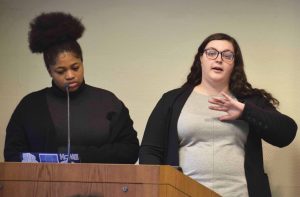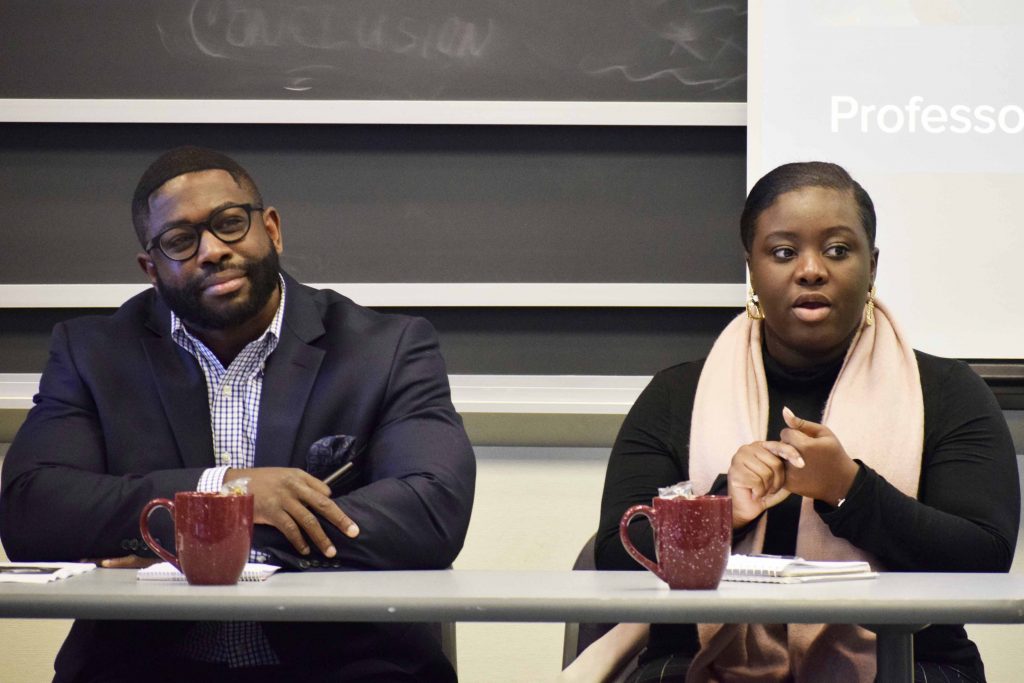If reproductive justice is the right of all women to have total economic, social, and political power—and the resources—to make healthy decisions about their bodies and families, then the United States is not delivering that justice, especially to minority women, according to Rachel Taylor and Chinyere Okogeri, moderators of “I Know My Body: A Dialogue on Race and Reproductive Justice.”
The November 13 event, sponsored by If/When/How: Law Students for Reproductive Justice and the Black Law Students Association, featured speakers Adriana Jean Louis, founder of a doula agency that works with underserved communities in Massachusetts, and Hernandez Stroud, BC Law Robert F. Drinan Visiting Assistant Professor.
Citing Centers for Disease Control statistics that show the United States has the highest rate of maternity mortality in the developed world, Taylor noted that black women die at a rate of 40 per 100,000 births in the US, white women at a rate of 12.4 deaths per 100,000 births, and women of other races at a rate of 17.8 per 100,000.
The speakers provided some perspectives on what these numbers mean in human and legal terms.
Jean Louis deals with women in all stages of reproductive health, predominately adolescent mothers, mothers of Haitian descent, women of color, and women with a history of trauma. She started her agency, Doula Noire Philosophy, after seeing what her young cousin, an immigrant from Haiti who was not proficient in English, faced “as a black woman, pregnant, in the system, and on Medicaid.”
As a doula, Jean Louis has addressed numerous instances of trauma related to childbirth that her patients have experienced. She described one client’s story of being in labor: “I had a mom who hemorrhaged on the delivery table and was told by doctors to stay there for nine hours until they eventually delivered her baby by C-section. She was in the hospital, in the bed, for nine hours.” At hour four or five, the woman said she no longer wanted to be there, but instead of rescheduling her—which Jean Louis said would have been the logical decision—the hospital staff pressured her into staying. The mother, Jean Louis said, is still traumatized by the ordeal.
Professor Stroud first became aware of the crisis surrounding reproductive justice while working as a teacher for Teach For America from 2010 to 2012, when he had a student’s mother confide in him her longtime struggle with drug addiction and her newly discovered pregnancy. Later, while researching and lecturing as a fellow at Yale Law School, because of his interaction with his student’s mother, he turned his attention to the frightening state of the way women are treated by the criminal justice system in many states.

During the event, he detailed some of his research about women who use drugs and happen to become pregnant, including one instance in Alabama, where a chemical endangerment statute was used to prosecute a woman for murder who had a stillborn birth as a result of her drug addiction. Professor Stroud said that while state legislators enacted the statute to prevent live children from being exposed to meth labs in the home, creative local prosecutors repurposed the law to apply to pregnant women’s drug use.
He also addressed implicit biases in medical training, stating, “although medically, while it is true that certain groups of people may be more prone to having one condition or another, doctors must be careful not to develop bias, especially toward vulnerable, disadvantaged populations in our society.”
Veronika Waldinger, a 2L, raised the question as to the effects of the Trump administration’s limitations placed on immigrant access to Medicare and Medicaid and the correlation that has to immigrant women seeking medical care during pregnancy. Jean Louis said that in her time working at Boston Medical Center, she has seen “a dramatic decline in women seeking prenatal help for fear of persecution.”
Other topics addressed at the gathering ranged from inequity in medical decision-making to how the intersectionality of reproductive justice can be used to move the cause into the forefront of our collective agenda.


